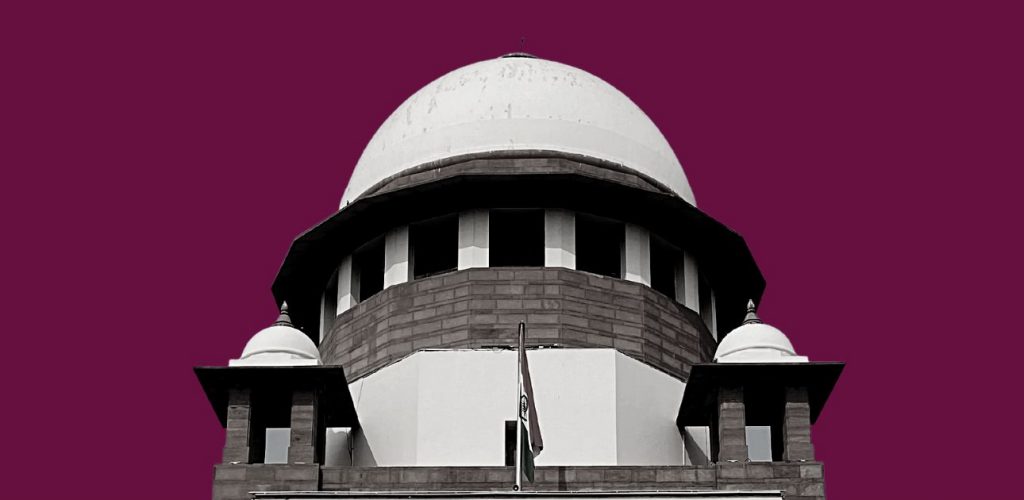A bench, consisting of Justices BR Gavai and Prashant Kumar Mishra, granted interim protection from arrest to journalists Ravi Nair and Anand Mangnale, OCCRP South Asia editor. The bench was hearing writ petitions filed by both, Ravi Nair and Mangnale, challenging the summons issued against them by the Ahmedabad crime branch, asking them to appear in person for questioning with respect to the police’s “preliminary probe” into their article published on the Organized Crime and Corruption Reporting Project (OCCRP) website. The article was reportedly critical of the Adani group.
“Why have they approached the Supreme Court directly?” Justice Gavai asked Senior Advocate Indira Jaising, representing both journalists, at the outset of the hearing. “The notice is completely without jurisdiction. They cannot be driven to go to that place,” the senior counsel promptly countered. The first question, she said, is by what authority of law the Gujarat police issued these notices, states LiveLaw.
“The notice is issued purportedly in connection with a preliminary inquiry instituted to probe into the article, on the basis of an investor’s application,” Jaising told the bench, before pointing out that Nair and Mangnale had not been provided with copies of the application that the summonses referred to. Not only this, but the duo were neither informed of the legal provisions invoked to issue the notices nor whether a first information report (FIR) was pending against them in connection with these notices. Moreover, when they wrote to the Ahmedabad crime branch seeking additional information, they were told that the documents sought would be provided when they appeared for questioning.
The Gujarat police reportedly also informed Ravi Nair and Mangnale that the question of registering an FIR would not arise at this stage, Jaising revealed. “Therefore,” she argued, “If it is their case that no FIR has been registered, then by what authority are they being called?”
“Is it a Section 41A notice? Is it a notice under Section 160? Do they stand in the character of the accused? Or are they witnesses? There’s no clarity,” Jaising emphatically contended. She also added that if the notices had been issued under Section 160 of the Code of Criminal Procedure, under which police officers can compel the attendance of witnesses, they were liable to be set aside on grounds of lack of jurisdiction. “If they are Section 160 notices, they could not have been issued by the Gujarat police since their residence is in Delhi. Gujarat police’s jurisdiction does not extend to Delhi.”
It is also not a notice under Section 41A of CrPC, Jaising insisted, pointing to the non-registration of an FIR –
“Offences must be cognizable or non-cognizable. There’s no third category. If it’s a cognizable offence, an FIR under Section 154 of the Code of Criminal Procedure must be registered. On their admission, no such FIR has been registered. If that is the case, then by what authority are they being summoned to appear before an officer who does not have jurisdiction to summon them?”
“This is nothing but pure and simple harassment and a prelude to a possible arrest,” she asserted, “There is no authority to summon them and these summonses are a violation of their rights under Article 21 of the Constitution.”
The violation of the fundamental right to life and liberty of the two journalists, Jaising contended, justified a petition under Article 32 of the Constitution. “There’s no reason why they should be driven either to appear before this police officer, or to approach any high court.”
After hearing the senior counsel’s submissions, the Justice Gavai-led bench issued notice on both pleas. At Jaising’s insistence, the court also agreed to grant the duo interim protection from coercive action.
Background
In January 2023, the United States-based Hindenburg organisation published its report accusing the Adani group of widespread manipulations and malpractices to inflate its stock prices. Adani Group refuted the allegations by publishing a 413-page reply.
In March, the Supreme Court constituted a committee to be headed by former top court judge AM Sapre and appointed former bankers OP Bhat and KV Kamath, Infosys co-founder Nandan Nilakeni, advocate Somasekharan Sundaresan, and retired judge JP Devadhar as members of the committee. This committee was directed to submit its report in a sealed cover within two months. At the same time, the Securities and Exchange Board of India (SEBI) was also asked to continue its investigation into the volatility in the Indian securities market and submit its report within two months.
The expert committee submitted its report in May, announcing its prima facie finding that there is no regulatory failure on the part of the Securities and Exchange Board of India (SEBI) with relation to the Adani group of companies. The market regulator, after seeking multiple extensions, finally submitted its report in August, informing the court that out of the 24 investigations in the Adani-Hindenburg matter, 22 have attained finality, while the remaining two are currently underway.
In the duration, journalist Ravi Nair and OCCRP South Asia editor Anand Mangnale have come under the Gujarat police’s scanner for a critical article they co-authored along with NBR Arcadio entitled ‘Documents Provide Fresh Insight Into Allegations of Stock Manipulation That Rocked India’s Powerful Adani Group’. This article was published on the website of the Organized Crime and Corruption Reporting Project. In October, Nair and Mangnale received notices from Ahmedabad’s crime branch directing them to appear in person in connection with a preliminary inquiry being conducted on the strength of an application by an investor, Yogeshbhai Mafatlal Bhansali.
Related:

